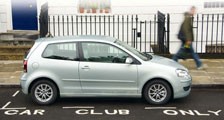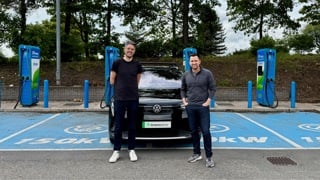A car club has launched a salary sacrifice scheme where if an employee rents a vehicle they can use a portion of their pre-tax salary to pay for it.
Salary sacrifice for cars has seen significant growth in the past year, with April’s National Insurance rise helping to fuel interest (Fleet News, August 18).
However, in what is an industry first, Streetcar, which is part of Zipcar, has worked with HR consulting company Aon Hewitt to launch the tax-saving benefit.
Mark Walker, Streetcar’s general manager, said: “We’re delighted to offer this new scheme to businesses that want to provide a compelling incentive to their staff, which combines the benefits of a company car scheme, with the convenience and environmental advantages of a car club.”
Streetcar offers employees of companies signed up to the scheme the ability to exchange a portion of their pre-tax salary for access to a range of low-emission VW and BMW cars and vans on an hourly or daily basis, by purchasing and redeeming a number of ‘trip codes’ per month.
Each trip code will be valid for five hours of Streetcar usage and will represent an effective reduction of up to 50% on the service’s usual hourly rates, thanks to the pre-tax salary exchange.
With the facility to redeem trip codes on any of the vehicles in the Streetcar fleet, salary sacrifice scheme members book their vehicle like any other member, either online or over the phone, as little as 30 minutes ahead of time, and use a smartcard to unlock the vehicle. At the end of the journey the car is returned to a dedicated Streetcar parking space.
Alternatively, members can locate, book and even open a car using the company’s iPhone app.
Members benefit from the low tax rates associated with Streetcar’s low-emitting fleet and only pay benefit in kind tax for the days when they actually use a vehicle.
Walker said: “In these turbulent economic times where salary increases are not always possible, we are excited to offer a tangible benefit to companies looking to reward their employees in other ways.”
However, Alastair Kendrick, a tax director at MacIntyre Hudson, warned that an agreed level of salary sacrifice for a car is crucial to qualify for the tax benefit. Otherwise, any tax exemption may be lost and the employee would have to pay income tax on the benefit amount.
In the case of Heaton vs Bell, the House of Lords decided that the benefit of a company car provided through a salary sacrifice arrangement was chargeable to income tax as earnings.
The key feature of this particular case was the ease with which the employee could give up the car and revert to the higher cash salary.
“The courts decided in the case of Heaton vs Bell that if the salary sacrifice was not fixed for a reasonable time period the sacrificed amount would be taxed,” explained Kendrick. “There is no definition of what is a reasonable time period, but it is thought to be 12 months.”
Meanwhile, employer provided childcare vouchers, workplace parking and cycles and cycle safety equipment – all common salary sacrifice benefits - are exempt from this ruling.
However, Walker told Fleet News that its salary sacrifice concept, which was initially launched internally to Streetcar employees, had received the backing of Her Majesty’s Revenue and Customs (HMRC).
“There is absolutely no reason why it shouldn’t work for other organisations,” added Walker.
By offering a salary sacrifice scheme, Streetcar is giving itself another route into the corporate market. It has already been adopted by legal firm Freshfields and Walker says that more companies are keen to sign up.
Car clubs have enjoyed success with their retail offering, but an increasing number of private and public sector fleets are turning to them as a flexible alternative to pool car schemes.
Three years ago, Streetcar and Zipcar had around 150 business accounts, but that has now swollen to 3,500, with 40% growth this year alone.
Walker revealed that the majority of their business customers fell into the SME category. However, they had also signed up some public sector organisations which, while relatively small in number, had a disproportionate number of members.
For example, Croydon Council has saved approximately £500,000 in the past year by persuading employees to use Streetcar vehicles in a pool car scheme, rather than drive their own cars for council business – the so-called grey fleet.
This latest offering comes as Streetcar is in the process of being integrated into Zipcar, following its acquisition of the car club in April 2010.
Streetcar operations in Oxford, Cambridge, Bristol and Brighton have already been rebranded to Zipcar, while London will follow suit in October.
“It will mean more cars in more places, nearer to where people work and live,” said Walker.
























Login to comment
Comments
No comments have been made yet.